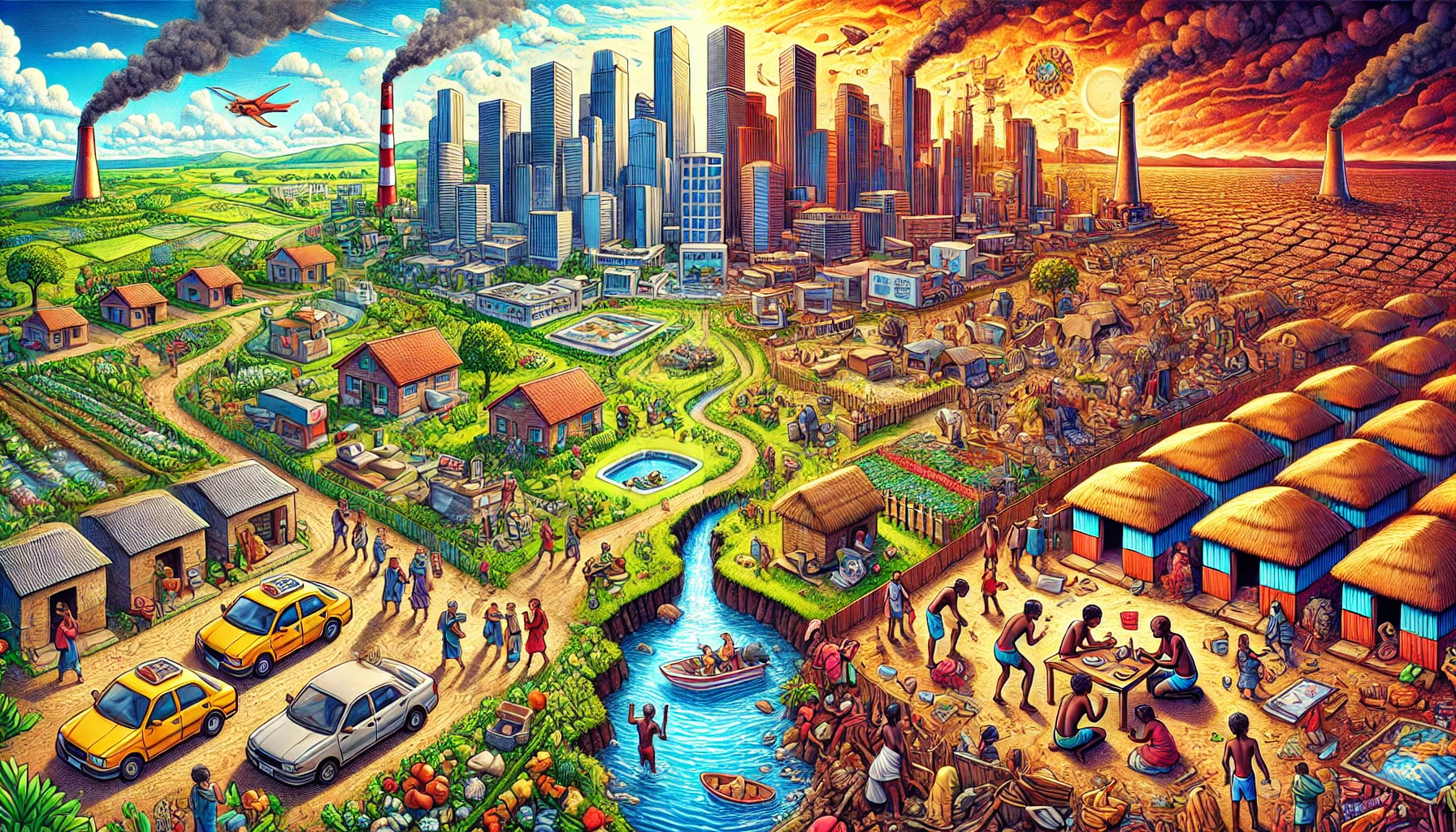Unequal Roots: Exploring Inequality and Reform in Sub-Saharan Africa
The document examines the multi-dimensional inequality in Sub-Saharan Africa, highlighting economic, social, political, and environmental disparities fueled by weak governance, gender inequities, and systemic challenges. It calls for comprehensive reforms, inclusive policies, and international cooperation to foster equitable and sustainable development.

Research from the African Development Bank, United Nations Development Programme, and World Bank analyzes inequality in Sub-Saharan Africa. It examines the structural, social, economic, and political dimensions of inequality in the region, offering insights into how these factors interconnect to perpetuate cycles of poverty and exclusion. Despite periods of economic growth in certain areas, wealth distribution remains starkly uneven, with a small elite controlling a disproportionate share of resources. Meanwhile, a significant majority of the population lives in poverty, facing limited access to education, healthcare, and economic opportunities. Structural barriers such as poor infrastructure and underfunded public services further exacerbate these disparities, leaving millions of people without basic necessities.
Governance Failures and Political Exclusion
Weak governance emerges as a critical driver of inequality in the region. The document highlights how corruption, lack of accountability, and inefficient public administration create an environment where resources intended for public welfare are often mismanaged or stolen. Political exclusion further compounds the problem, as ethnic groups, regions, and communities are frequently marginalized from decision-making processes. This exclusion leads to unequal development outcomes, often triggering social tensions and conflict. The intersection of economic inequality and political marginalization creates a vicious cycle, where the most disadvantaged populations lack the resources and representation needed to escape poverty.
Gaps in Healthcare and Education
Healthcare and education are spotlighted as crucial areas where inequality is most visible. Sub-Saharan Africa has some of the world’s lowest healthcare access rates, with rural populations and women disproportionately affected. Inadequate infrastructure, a lack of medical professionals, and insufficient funding contribute to high mortality rates and widespread preventable diseases. Similarly, education systems face significant challenges, including low enrollment rates, poor infrastructure, and a shortage of trained teachers, particularly in rural and underserved areas. These systemic deficiencies limit human capital development, perpetuating poverty and hindering economic growth. Without addressing these foundational issues, the region faces significant barriers to achieving sustainable development.
The Cross-Cutting Challenge of Gender Inequality
Gender inequality is identified as a critical issue that cuts across all dimensions of inequality. Women in Sub-Saharan Africa face systemic barriers to education, healthcare, and economic participation. Discriminatory legal frameworks, traditional norms, and limited access to resources such as land and credit leave women disproportionately disadvantaged. Harmful practices such as early marriage and gender-based violence further entrench these disparities. Women’s empowerment is central to achieving equitable development, and the document calls for policies and programs that address systemic barriers while promoting cultural and social change to foster gender equality.
Environmental Challenges and Global Systems
The document also explores how environmental and global economic systems exacerbate inequality in Sub-Saharan Africa. The region is particularly vulnerable to climate change, with droughts, floods, and other climate-related shocks disproportionately affecting rural and poor communities. These events strain already limited resources, making it difficult for vulnerable populations to recover and adapt. Additionally, global economic systems contribute to the region’s inequality. Trade imbalances, colonial legacies, and external debt burdens limit Sub-Saharan Africa’s capacity for inclusive growth. Economic shocks such as commodity price fluctuations and global financial crises disproportionately impact the region, emphasizing the need for economic diversification and structural reforms.
A Roadmap Toward Equitable Growth
The document concludes with a call for comprehensive strategies to address these multi-dimensional challenges. It advocates for increased investment in social sectors, particularly education and healthcare, and reforms to strengthen governance and accountability. Inclusive political processes and strengthened institutions are seen as critical steps to reducing inequality and fostering social cohesion. International cooperation and regional collaboration are emphasized as essential to addressing systemic challenges such as trade, climate adaptation, and conflict resolution. By creating policies that prioritize inclusive growth and sustainability, Sub-Saharan Africa can build a more equitable future.
Ultimately, the analysis paints a complex picture of inequality in Sub-Saharan Africa, emphasizing that these challenges are deeply rooted in historical, structural, and global dynamics. Tackling them requires a holistic approach that combines national policy reforms with international support and community-driven initiatives. Governments, civil society, and international actors must commit to creating systems where all individuals, regardless of their circumstances, have the opportunity to thrive. The document stresses that addressing inequality is not only a moral imperative but also a prerequisite for long-term stability and prosperity in the region.
- FIRST PUBLISHED IN:
- Devdiscourse
ALSO READ
World Bank's Decade-Long Vision: A New Era for Pakistan
World Bank Launches 2025 with AUD 1.75 Billion Sustainable Development Bond in Kangaroo Market
World Bank Group’s 2024 Validation Report: Key Insights on Progress and Challenges
World Bank’s Climate Report: Driving People-Centric Action for Resilience
Chile Receives $5.1M from World Bank for Cutting Carbon Emissions Through Sustainable Forest Management










